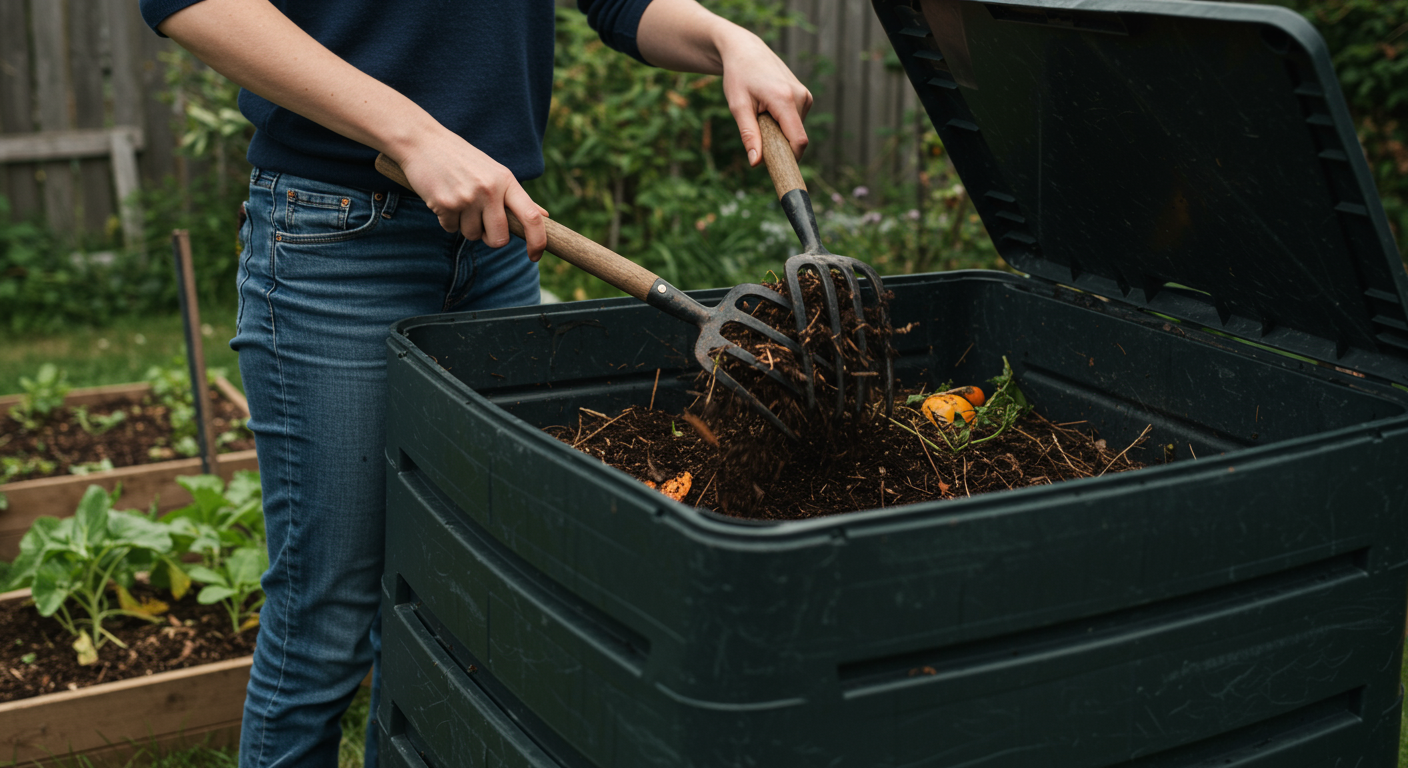Welcome to the world of home composting! If you're new to sustainable living, this guide is your friendly introduction to transforming kitchen scraps and yard waste into nutrient-rich soil. Composting is an easy, rewarding way to reduce your environmental impact and create a thriving garden. It's a win-win: less waste in landfills, healthier plants, and a greener planet. Let's get started!

Why Embracing Home Composting Matters for a Greener Life
Home composting is more than just a trend; it's a crucial step towards a sustainable lifestyle. By composting, you significantly reduce the amount of organic waste sent to landfills. This is important because when organic waste decomposes in landfills, it produces methane, a potent greenhouse gas contributing to climate change. Composting also enriches your garden soil, reducing the need for chemical fertilizers and pesticides. Your plants will thank you, and so will the environment. Plus, composting is a fantastic way to connect with nature and understand the cycle of life and growth.
Essential Steps to Get Started
Starting your home composting journey is simple. Here's a step-by-step guide:
- Choose Your Method: Select a composting method that suits your space and lifestyle. Options include a simple compost pile, a tumbling composter, or a worm composting system (vermicomposting).
- Gather Your Materials: You'll need a mix of "greens" (nitrogen-rich materials like food scraps, grass clippings) and "browns" (carbon-rich materials like dried leaves, shredded paper). Aim for a balance of about 1:3 (greens to browns).
- Build Your Compost Pile: Layer your greens and browns, keeping the pile moist but not soggy. Turn the pile regularly (every few weeks) to aerate it and speed up decomposition.
- Maintain Your Compost: Monitor the moisture level, turn the pile, and add more materials as needed. Compost is ready when it looks dark, crumbly, and smells earthy.
- Use Your Compost: Add the finished compost to your garden beds and pots to enrich the soil and promote healthy plant growth.
Common Beginner Questions Answered
- What can I compost? You can compost a wide variety of kitchen scraps, including vegetable and fruit peels, coffee grounds, eggshells, and tea bags. Yard waste like leaves, grass clippings, and small branches are also great.
- What should I avoid composting? Avoid composting meat, dairy products, oily foods, and diseased plants, as these can attract pests or create unpleasant odors.
- How long does it take to compost? The time it takes to compost varies depending on the method and conditions. A well-maintained compost pile can produce finished compost in a few months, while other methods may take longer.
- What if my compost smells bad? An unpleasant odor usually indicates that the pile is too wet or lacks air. Add more browns, turn the pile, and ensure adequate aeration.
Tips for Success (e.g., easy swaps, habit formation)
- Start Small: Begin with a small compost bin or pile to get the hang of it. You can always expand later.
- Chop Food Scraps: Cut or chop your food scraps into smaller pieces to speed up decomposition.
- Layer Correctly: Layer greens and browns in a balanced ratio to maintain a healthy compost pile.
- Keep it Moist: The compost pile should be as moist as a wrung-out sponge. Add water if it's too dry.
- Turn Regularly: Turning the pile helps aerate it, which is crucial for decomposition. Aim to turn it at least once a week, or more frequently if you have a tumbler composter.
- Be Patient: Composting takes time. Don't get discouraged if it doesn't happen overnight.
Understanding Your Impact
Composting at home significantly reduces your household waste. On average, food scraps and yard waste make up a large percentage of what goes to landfills. By composting, you're diverting these materials from landfills, reducing methane emissions, and conserving valuable resources. Composting also reduces the need for chemical fertilizers, which can pollute waterways and harm the environment. In addition, using compost in your garden improves soil health, reduces water usage, and promotes healthier plant growth, contributing to carbon sequestration.
Finding Eco-Friendly Alternatives
Complement your composting efforts by incorporating other eco-friendly practices into your home and garden. Consider using reusable food storage containers, reducing your use of plastic bags, and choosing organic gardening methods. Explore other ways to live a more sustainable lifestyle by reducing consumption and making conscious choices. For example, use Hydro Flask to carry water instead of buying plastic bottles.
Quick & Easy Sustainable Swaps
- Reusable Food Storage: Instead of plastic wrap and plastic bags, use reusable containers like Stasher Bags or glass containers to store food.
- Compostable Bags: Use compostable bags for collecting food scraps in your kitchen to make the process more convenient.
- DIY Cleaners: Make your own natural cleaning solutions using ingredients like vinegar, baking soda, and essential oils.
- Shop in Bulk: Buy food in bulk to reduce packaging waste.
Next Steps in Your Green Journey
Now that you've taken your first steps into composting, consider the impact of your choices. Further enhance your eco-friendly practices by exploring other sustainable living methods. Educate yourself on topics like reducing waste, saving energy, and conserving water. By embracing these habits, you contribute towards creating a healthier planet. Remember, every little bit helps, and your efforts create a positive influence!